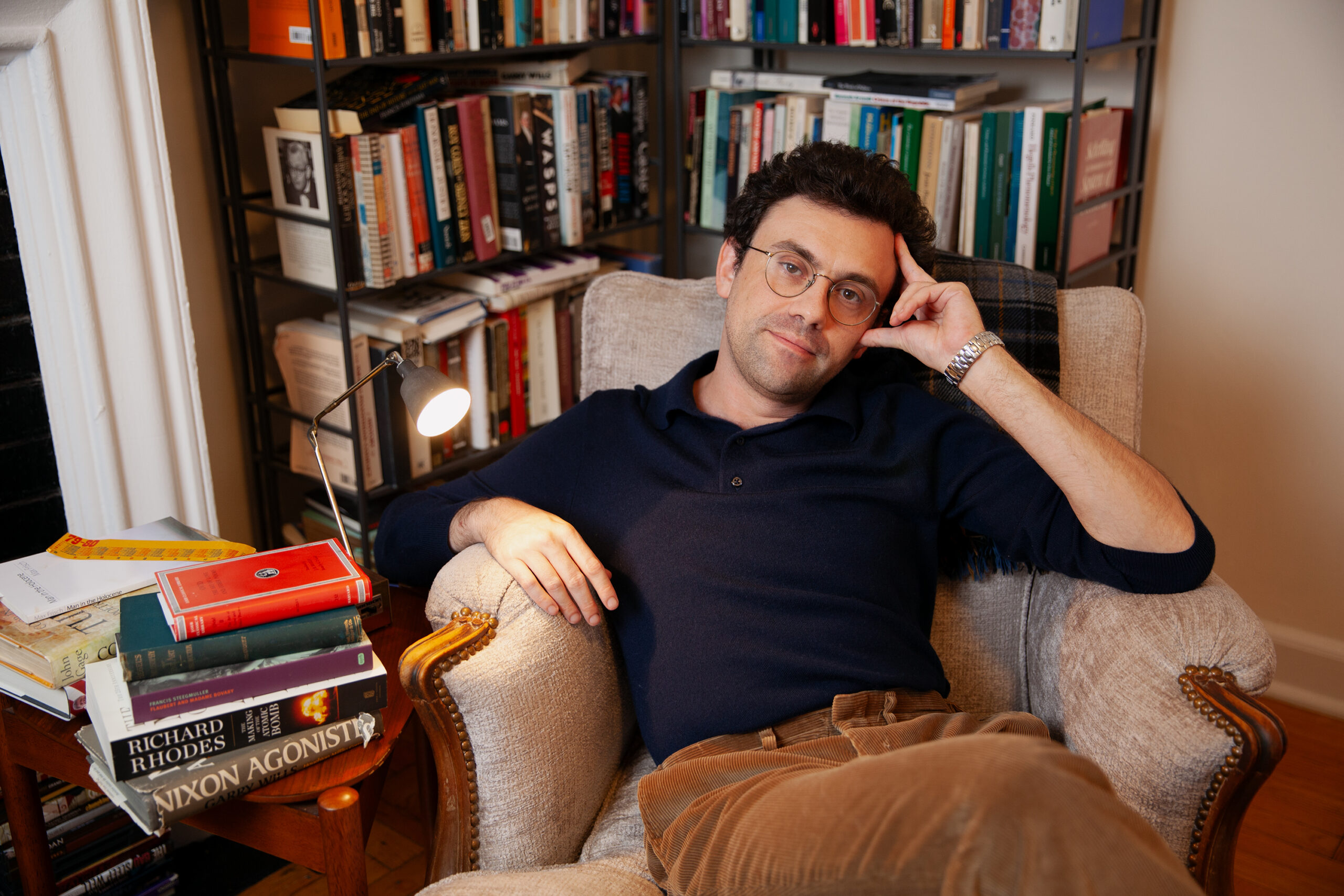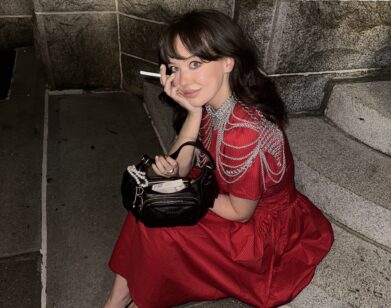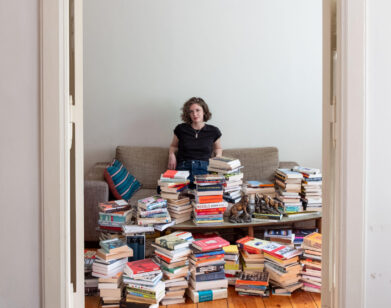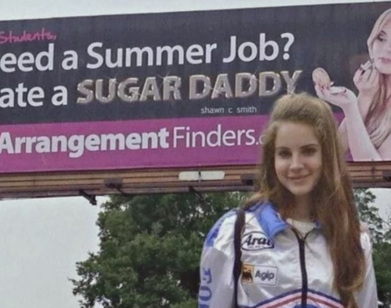LIT
“Yeah, Motherfucker. I Do Have a Substack”: John Ganz, in Conversation With Lauren Oyler
You may know the writer John Ganz from X, formerly known as Twitter, where, by his own admission, he often finds himself sparring about politics with faceless morons who have far fewer followers than he does. “I’ve never been good at pretending that things don’t bug me, and people know that they can get under my skin,” Ganz confesses. “But you just have to fight fire with fire.” Or perhaps you’re one of the thousands who follow his Substack “Unpopular Front,” a repository for his whip-smart musings on everything from fascism and technocracy to the wars in Gaza and Ukraine. In any case, you’ll know him now as the author of When the Clock Broke: Con Men, Conspiracists, and How America Cracked Up in the Early 1990s, a panoramic and at times novelistic survey of a period in American history marked by social unrest, ambient paranoia, and a general crisis of political confidence. And though many of us, nowadays, find ourselves romanticizing the 90s, Ganz demonstrates a keen understanding of the way memory can distort. “It is possible to be nostalgic for times that were terrible,” he told the critic and novelist Lauren Oyler when the two got together on Zoom last week. Oyler, of course, is another internet rabble-rouser, though she’s spending less time on Twitter these days. “I’m jealous of your ability to get into these quite distasteful fights online,” she told Ganz. “I haven’t fought on the internet since I was 24.” But Ganz isn’t backing down anytime soon. Below, he and Oyler get deep about the music of the 1990s, hierarchies of art, writing on Substack, and how to win a Twitter brawl.
———
LAUREN OYLER: Recording in progress. So, happy birthday.
JOHN GANZ: Thank you so much.
OYLER: How old are you?
GANZ: I’m 39.
OYLER: I have a segue, which is that our generation seems quite attracted to the ’90s now.
GANZ: Yeah.
OYLER: Why do you think that is?
GANZ: Well, I think people remember it really fondly because they don’t remember it completely. There are things that were great about it. I think the country was peaceful and prosperous and it felt like things were going to continue that way. But I think in the early part of the decade, it looked like we were going to go in a different direction. So that’s what I wanted to focus on. Also, some of the things that I talk about in my book went subterranean in the ’90s. There was the militia movement. There was all kinds of crazy, conspiratorial stuff about Clinton. There was the Oklahoma City bombing. But yeah, I don’t blame people for feeling nostalgic for it. It was a groovy time. There was a lot of great music. I wanted to be in Hackers or something like that. I have fond feelings for the time, too, which makes me more interested.
OYLER: Yeah. I was born just after the fall of the Berlin Wall, so I’m interested in this concept of nostalgia for a time that you don’t really experience. You often hear people say, “If you remember the ’90s, you weren’t really there.”
GANZ: I think that was from the ’60s.
OYLER: You think?
GANZ: I think it keeps moving up.
OYLER: They say that every fun decade. Well, let’s stay on this actually, because you said you’re talking about stuff that is subterranean. I think I’ve read interviews where you say, “No, you’re misremembering the ’90s when you think about it as these great, easy, prosperous days.” And I think there is something appealing about that pose to, if not our generation, then our milieu, which is roughly young-ish critics online, right?
GANZ: Yeah.
OYLER: You see this in all sorts of media that we produce. We like to see ourselves as correcting the record for all the older people who’ve been living with the wool over their eyes, or whatever.
GANZ: Yeah. I’m just doing what a historian does, which is that there’s memory and then there’s history. So we have a certain sense of an era, and then historians look at the documents and say, “Well, the sense that we have and what actually took place might be two different things.” I don’t start off by saying, “Oh, you misremembered this and I’m going to correct the record.” I say, “Yeah, the latter half of the decade was, superficially at least, very prosperous and remembered fondly. And the ’80s were, for some people, very tough, but also a boom time for others.” But this weird little time period, which I don’t think is remembered very well at all, was an extraordinarily gloomy moment for the country.” It is possible to be nostalgic for times that were terrible. People are plenty nostalgic for World War II. People love the clothes and the music and it was the worst time of humanity. But if you listen to the music of the early ’90s, it’s grunge and gangster rap, and those are two pretty unhappy music genres. So I think it’s possible to recognize that the times weren’t good but also say, “Well, they produce some interesting cultural products.”
OYLER: You talk about this very briefly in the introduction, the extremely nihilistic genres of music that emerge out of California and Seattle.
GANZ: It makes sense that things like that were happening there. It’s like, where the frontier ran out.
OYLER: Absolutely. And I think you can see parallels in the nihilistic cultural forms that have emerged in the last, say, four to eight years as well.
GANZ: Yeah. In the beginning of the ’90s, you have the grunge and the gangster rap stuff, but then ska and swing become really popular at some point, which are happier.
OYLER: But they’re kitschy.
GANZ: They’re kitschy, but they’re more joyful sounds. And I think it’s interesting that that comes later, in the middle of the decade. Everyone thinks they’re so cringe now, and they are, but I think that there was a level of irony to it that people don’t really appreciate. Also, I think it was the sense of the “history being over” kind of thing. It was just like, “Okay, we’re going to go back to the past.” I grew up thinking that’s what you do—you mine the past for things to bring back, you know?
OYLER: Of course. We grew up doing that, but at least in the literary world, there’s quite a growing frustration with postmodernism. There is a frustration with, “Are we just going to keep doing this cycle?” As the millennials get older and we see Gen Z doing the 2000s thing, it’s quite—
GANZ: Which is crazy to me, because I lived through it and there was nothing cool going on, in my opinion. The way I try to think about it with my own work is, obviously I’m attracted to older cultural products. Like, this book in a certain way is itself a throwback. The people I’m thinking of when I’m writing this book are people who I read when I was young: Rick Perlstein’s books, but also Gary Wills’ books, these books that were about both American politics and culture but were entertaining and for a general readership and not totally scholarly. This is almost an older tradition that I wanted to bring back.
OYLER: In the most recent issue of Harper’s, you published a personal essay using historical research, which is what an essayist does. But I feel there’s some discomfort that exists in this space where people can’t say, “Oh, that’s a critic, that’s a journalist, you’re not staying in your lane,” or whatever.
GANZ: Well, I always wanted to be an artist. I went to graduate school for painting. I always wanted to be someone who focused on the formal side of things and created things that were formally interesting or beautiful. I realized at some point that I don’t exactly have the capacity to do that. They’re not great paintings. And I’ve always been interested in politics, so I think I needed to be tied to some kind of subject matter, and then I can try to put it in a form that I find pleasing or that other people find pleasing. But if I had a choice, and if I didn’t have the limitations of who I am as a person, which you just have to accept, I would just make art and make beautiful forms. It’s wonderful to be able to write about any subject matter, and I find politics to be fascinating. It’s not like I look down on it, but obviously there’s a hierarchy of art, and journalism is not at the top of it. I can live with that. I think that’s also when I became free and things really started to work out for me creatively, when I was like, “Okay man, maybe you just write about politics, there’s nothing wrong with that.” If I had tortured myself and tried to write novels or continued to make paintings, I would’ve just spun my wheels and done nothing. I don’t think form and content need to be separated in this way, but I guess I grew up thinking that form was more important and that content was secondary.
OYLER: Well, I think you need both. Correct?
GANZ: Of course.
OYLER: And no one’s going to say, “Don DeLillo is not an artist.” Right?
GANZ: No.
OYLER: Would you ever try to write a novel?
GANZ: I would like to.
OYLER: Your book is not not novelistic at times. But let’s turn the corner a little bit and talk about the opposite of art, which is Substack.
GANZ: [Laughs] Oh, yeah.
OYLER: Why did you start that, and when did you start it?
GANZ: I had to do it because I didn’t know how I was going to make a living. I lost my job. I had a copywriting media job and I was editing at that time. And the way I started on Substack, it was like I was writing these history things. But it was really wonderful how people responded and it became viable over a couple of years. Everybody who reads it knows that the copy-editing is atrocious. Working with a really good editor is part of the creative process of being a writer. I strongly believe that. If I took three quarters of the shit I write on Substack to an editor, they would be like, “What the hell are you talking about? We’re never going to fucking publish this.” But I think it’s a really good thing and it’s a way for writers to make a living and a name for themselves. And I also think it’s great for people whose stuff is weird, where an editor might not want to take a chance on it. It’s also like, indie or punk rock-ish, like you’re just putting your tape out there.
OYLER: Did you ever blog?
GANZ: During my 20s. Well, I had a live journal, so I guess that counts.
OYLER: Totally.
GANZ: It was very emo. It was a lot of stupid pictures and complaints about—
OYLER: Some would argue that your internet presence remains very emo.
GANZ: Well, it’s definitely emotionally unbalanced. [Laughs] It’s… expressive. You know who was a really big influence on me, with how I approached becoming a writer? Ta-Nehisi Coates. I read his blog on The Atlantic and he responded. It was just this really generous form of intellectual engagement that I thought was great. I don’t share that much in common with him, but I loved that. I feel sad, because I read Gawker because my girlfriend in college liked it, but I wasn’t really a part of that world. I feel like I missed out. But it worked out anyway.
OYLER: I feel like it’s traumatizing in many ways.
GANZ: People say that. Maybe it was better that I missed it.
OYLER: Something that I’ve noticed reading not just your work but also the reviews of this book and some interviews with you is that the description of who you are will say, “He runs the popular Substack.” It’s legitimizing Substack. It’s been interesting to watch it happen really rapidly over the last four years, right?
GANZ: Yeah.
OYLER: Until last year, people would be like, “Oh, Substack, ha, ha, ha, fuck off.” As someone who has had a more traditional career in many ways but is still called “very online,” it’s interesting to observe.
GANZ: Yeah. I think that’s where writers who are ambitious and trying to make a name for themselves go, and there’s nothing really wrong with that. There’s really nobody who’s not online. That’s where writing happens.
OYLER: Sure.
GANZ: It’s good to take a break sometimes and to remember that there are other things, but most of the writers are aware of what’s going on on the internet and it’s a place where discourse is happening, for better or worse. Sometimes people give me shit about being a Substacker, but it never really bothered me because I just had to do it. It was how I was making a living and I didn’t feel ashamed of it. I’m obviously status-obsessed, and I like fancy things, but when you get put in that position, you just feel proud of it. So then you’re like, “Yeah, motherfucker. I do have a Substack. And I’m making money off of it. Isn’t that funny?” You start to get this chip on your shoulder, which is silly because then you get this idea of yourself where you’re like, “I’m this populist, scrappy guy, and I’m showing up all these fancy professors,” which is ridiculous because I grew up in fucking Manhattan. I went to private school and I went to University of Michigan. But you start to think that way because you have to come up with a story for yourself. And when you feel embattled, it can help.
OYLER: It does help, for sure—revenge.
GANZ: Revenge, which you wrote about very persuasively and interestingly. I wonder about that now.
OYLER: Why, now that you’ve made it?
GANZ: No.
OYLER: That’s cool. Then you get to say, “I’ve grown out of it.”
GANZ: But I haven’t.
OYLER: You haven’t, not yet. But it’s only been like a month, John. So you just have to wait until the end of the summer.
GANZ: Well, I’m supposed to quit Twitter. It does bug me. I’ve never been good at pretending that things don’t bug me, and people know that they can get under my skin. But you just have to fight fire with fire. I wish I was really chill, but the smallest fucking things bug me. This fucking guy who said something mean about my book, he’s got no Twitter followers. He got two likes on the post. I shouldn’t admit this, because then everyone’s going to fucking know it gets under my skin.
OYLER: I feel like you should be occupying more noblesse oblige now.
GANZ: Yeah, I really should.
OYLER: Well, do you worry about those Twitter episodes? At least the ones that I’ve seen you engage in seem like a little bit of a performance, right? It’s a little bit like, “Sir, I challenge you to a duel.”
GANZ: I mean, I’m pretty fucking pissed off.
OYLER: But you’re channeling it, you know? The book is very even-toned. It’s not very serious. It’s quite funny, but it is not like your Twitter.
GANZ: Yeah. I get irritable on Twitter because I’m just constantly being bombarded with annoying shit. But when I’m sitting down to write my book, my mind goes in different ways, which is good to think about. But I was a little worried that somebody might have a grudge against me and try to take me down a peg or two and be like, “We’re going to show this Ganz guy.” But that hasn’t really happened, not yet. I’ve gotten some critical reviews and that bugs me a lot less than some annoying person on Twitter. I’m like, “Well, you take the book seriously, that’s cool.”
OYLER: Yeah.
GANZ: Again, as they say in The Godfather, “This is the life we chose. This is the business we chose.” It’s going to get scrappy because that’s the way I do things, and you just have to accept the fact that somebody might have a grudge or not like me very much.
OYLER: And on top of it all, you talked to the reviled Lauren Oyler.
GANZ: Yeah, I know. Well, I wonder what your experience with that has been like. You wrote things that were highly critical and you must have had a feeling that someone might try to do something similar.
OYLER: Oh, yeah. But it’s boring. It’s not like I do it. I was thinking about this and I’m jealous of your ability to get into these quite distasteful fights online.
GANZ: Yeah.
OYLER: I haven’t fought on the internet since I was 24. You know what I mean?
GANZ: Right.
OYLER: I’m envious, because it is fun. Right?
GANZ: It is fun.
OYLER: It is the kind of thing that I fantasize about. Like, a duel among equals. But it’s not possible for me to do that, and—
GANZ: Why?
OYLER: Because even what I’ve done, which is a classical style of criticism, the only thing anyone ever talks about is that, right? If I were bitching on Twitter all the time, no one would ever even try to read my stuff, which is my priority.
GANZ: That’s a gender thing.
OYLER: Yeah. Not to be like, “I’m a victim of sex.”
GANZ: No, it’s totally a gender thing.
OYLER: Yeah, it’s an annoying gender thing. When you do that as a woman, people are like, “You’re just jealous.” Or they’re like, “You are crazy.” And in order to preserve some hope of people paying attention to my work, I just can’t do it. So I am jealous of you and your long-running fight with Daniel Bessner, or whatever. Also, just from a psychological point of view, I was on Twitter all the time, and I’m not anymore. I moved away from New York and, for various reasons, I’m just not on it anymore. And I have a fuller, richer life.
GANZ: Well, I’m envious of that. I spend way too much time on it. I have no self-control. But you’ve got to accept who you are as a person and then try to find a form that works. You’re like, “All right, dude. I’m a fucking lunatic. I’m going to get upset.” But then you just have to be like, “I have to get good at getting upset, make it funny and make it entertaining for other people and try to be witty.” Some people have a very chill vibe and some people are good at being angry.
OYLER: I also think that’s an artistic thing, an artistic impulse or an artistic mode of being that you’re describing. Which is like, “I am going to channel these uncomfortable or unsavory drives that I have into something productive.” It is performance.
GANZ: Subconsciously, when I’m doing it, I don’t think about it that way.
OYLER: Much less has been called a performance in our age.
GANZ: Well, that’s true. But what’s really weird about that is that I do have some friends who are like, “You seem insane.” They’re like, “When I hang out with you, you seem very nice and normal. And then when I read your Twitter, you sound like a raving lunatic.” And I don’t really know what to say to that. There is a certain level of irony to it where it’s like, “You need to understand that the heights of hysteria that I get to on the internet are a bit that I’m doing,” which is a self-parody or something like that.
OYLER: Can I ask one more question that’s more serious?
GANZ: Yeah.
OYLER: Regarding Substack, why do you write so much?
GANZ: Oh. Well, because I’m afraid if I don’t, people will unsubscribe and I won’t make as much money. That’s basically it.
OYLER: They’re so long.
GANZ: Some of them are long, yeah.
OYLER: How many words a week do you think you’re writing?
GANZ: I don’t know, maybe 3,000 words a week or something like that.
OYLER: But you’re also doing other writing as well on top of it. And then you’re tweeting all day every day, and then you’re doing some magazine pieces, and now your book is out, and presumably you’ll write another book. So actually you’re writing quite a lot, right?
GANZ: Yeah. I guess it just comes naturally to me, and it’s what I want to do. Quantity is good. And occasionally, if there’s a nice sentence in there, that’s a bonus. But I try not to agonize over it too much and just keep doing it. That’s basically where I try to stay.







